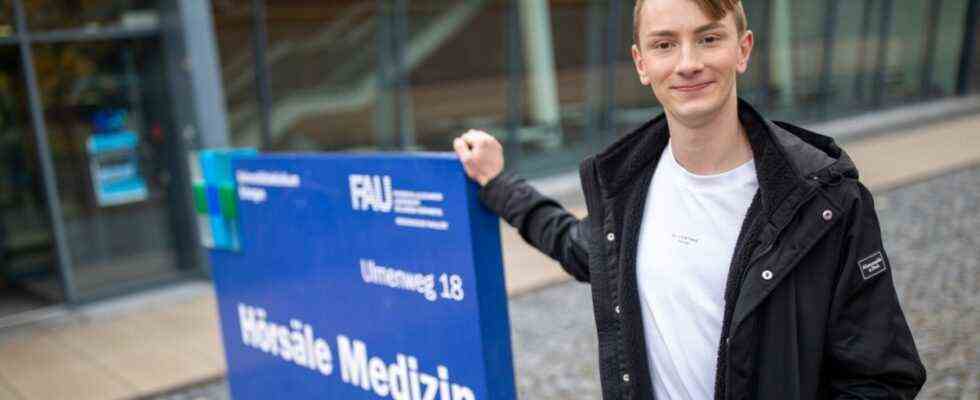Tommy Blumenthal is 22 years old, comes from the Harz district in Saxony-Anhalt, and the hopes of the Bavarian medical community and the Ministry of Health also rest a little on him. In about twelve years, he should do his part to prevent undersupply in rural areas in Bavaria. Like the other 114 young people who were admitted to medical studies for the current winter semester via the rural doctor quota, he even gave this to the Free State in writing: After studying and specialist training, they have to work in areas where there is a need for doctors for ten years. In return, the young people get the chance to fulfill their dream of becoming a doctor – even though they do not have an excellent high school diploma.
The desire to study medicine matured during his school days, says Blumenthal, who is moving to Bavaria to study and is now starting at the University of Erlangen-Nuremberg. At school, however, you have other thoughts, “and that’s why my Abitur wasn’t so perfect that I could get straight into it.” After training as a nurse and a year as a nurse, he made it through the Bavarian country doctor quota. The 22-year-old belongs to the second year, around 100 prospective country doctors started last October.
“At the end of the first year of study, we can draw a positive balance. Only one student of the Bavarian State Doctor Quota has so far broken off her studies,” says Health Minister Klaus Holetschek (CSU). Beate Reinhardt from the Bavarian General Practitioner Association also draws a positive conclusion: “It was a sensational start, I am thrilled.” The country doctor quota was long overdue.
The student Clara Waininger sits in the auditorium of the LMU Biomedical Center. Waininger has started nursing training, but has now been admitted to the medical degree, which she started in the winter semester 2021/2022, via the country doctor quota.
(Photo: Peter Kneffel / dpa)
“When the e-mail came, I was really overjoyed,” says Clara Waininger of the moment she received her acceptance. She was annoyed that she hadn’t noticed at school that she wanted to study medicine. Instead, her path initially led through a federal voluntary service and a qualification as a paramedic, then she began training as a nurse. All of this helped with the country doctor quota application: For example, previous experience in health professions, voluntary work, federal voluntary service and a good aptitude test are taken into account. The Abitur grade does not matter.
Beate Reinhardt from the General Practitioner Association says that the rural doctor quota is a start to think about the selection process for medical studies and “maybe include additional criteria. That means: social competence, practical knowledge. That is super important in medicine”. You can see it in people: “If they have been socially active, they are more likely to know what they are getting into and what they want.” Gerald Quitterer, President of the Bavarian State Medical Association, says: “Admission to medical studies should not only depend on the numerus clausus.”
5.8 percent of the study places are currently reserved for prospective country doctors. “5.8 percent is good, but it can be done even better,” says Reinhardt. In principle, a higher quota would be welcomed by the general practitioner association. Quitterer from the State Medical Association says the quota is just one component. “It would be more important to create 150 to 200 more study places per year,” he says. Because in the future, for example, because of part-time work, more people will be needed for the same work.
The only alternative would have been to study abroad
According to the Ministry of Health, around 350 new medical study places will be created. However, nothing will change in terms of the quota. In Bavaria the scope for the country doctor quota within the framework of the – according to the State Treaty – possible advance quotas has already been fully exhausted, the ministry announced. The quota is just one of several measures taken by the Free State to get medical professionals to where they are needed. Currently, the Free State has identified an “imminent undersupply” in 18 of 204 planning areas. Where we are headed for Blumenthal and Waininger after twelve years of study and specialist training cannot yet be said today.
The only alternative that would have been left for the two of them was to go abroad to study medicine. That would have been out of the question for Blumenthal, he says. He feels more comfortable here, and the decision to go abroad would have meant quite high study costs. “That would be a big sacrifice. A bigger sacrifice than this contract in any case,” says Clara Waininger. Because with the acceptance, rural doctor quota students make a far-reaching decision at a young age: After studying, training and ten years of work as resident doctors, they will be older than 40 years. “You simply move the center of your life somewhere else,” says Tommy Blumenthal from Saxony-Anhalt. “But it’s absolutely worth it to me.”
Clara Waininger says the decision wasn’t that difficult for her. “I think it’s an extremely fair offer that I get this place for my commitment.” She grew up in the Bavarian Forest. “I like the big city life,” she says. “But I definitely want to go back.” And one can still become a specialist afterwards or be employed in a clinic: “I believe we live in a time when life is not over even at 40 years of age.”

